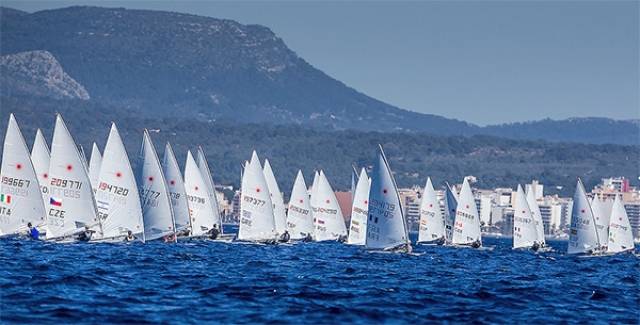Sunny Palma laid on some of its best conditions for the third day of the 47th Trofeo Princesa Sofia IBEROSTAR today but it all started with a lengthy delay as a weak south-westerly eventually gave way to a moderate southerly with winds from 10-16 knots and great sailing conditions.
Dublin's Finn Lynch posted a marginally better overall score for the day over London 2012 rep James Espey as the pair fight it out to decide the Rio 2016 nomination.
With the three Irish Lasers racing in the Silver fleet, Lynch had a consistent sixth and a fifth. Espey had a ninth and a third to finish the day six points behind his rival for the sole Rio place. A reminder that the contest could yet be a three-way affair came from Baltimore's Fionn Lyden who won the first race of the day but followed this with a 32nd place and trails Lynch and Espey by almost 20 places.
Kinsale’s Darragh O’Sullivan had a fifth and a second place in the Laser class Bronze fleet where he is a single point off the podium with two days of racing left.
The morning’s calm conditions delayed the skiff classes racing until even later in the day but the opening race for the women’s 49erFX saw Providence Team IRL's Andrea Brewster and Saskia Tidey suffer their worst result of the series so far with a back of the fleet 30th place. However, as the breeze freshened for the second race the pair recovered form to place 14th and they lie 19th overall. Two days of racing remain to make up the 20-point difference for a place in the medal race final on Saturday.
The men’s skiff event had an even longer wait ashore as the wind barely reached the minimum strength for racing conditions. Ireland’s Ryan Seaton and Matt McGovern placed eighth in the only race of the day and lie fourth overall in the 49er class to look good for the medal race on Saturday.
After two days of light winds, tomorrow’s forecast is for fresh to strong gusty winds on the Bay of Palma for the penultimate day of fleet racing at the regatta.
Leading Results:
470 Men: 1.- Mathew Belcher/ Will Ryan (AUS): 5pts, 2.-Stu McNay/Dave Hughes (USA): 19, 3.-Jordi Xammar/Joan Herp (ESP): 20; 470 W: 1.- Fernanda Oliveira/Ana Barbachan (BRA): 7pts 2.-Afrodite Kyranakou/Anneloes Van Veen (NED): 16 3.- Anne Haeger/Briana Provancha (USA) : 20'
49er M: 1.- Diego Botín/Iago López (ESP):15pts, 2.- Nico Delle/Nikolaus Resch (AUT): 18, 3.- Erik Heil /Thomas Plossel (ESP): 20; 49er FX W: 1.-Annemiek Bekkering/Annerre Duetz (NED): 25pts, 2.- Jena Mai Hansen/Katja Steen (DEN): 27, 3.-Charlotte Dobson/Sophie Ainsworth (GBR): 47.
FINN: 1.- Josh Junior (NZL): 15pts, 2.-Giles Scott (GBR): 19, 3.- Pieterjan Postma (NED):24pts:
LASER STANDARD: 1.- Andrew Maloney (NZL): 18pts, 2.- Tonci Stipanovic (CRO): 25, 3.- Kristian Ruth (NOR): 25pts. LASER RADIAL: 1.- Anne-Marie Rindom (DEN): 16pts 2.-Evi Van Acker (BEL):18, 3.- Tuula Tenkanen (FIN):20.
NACRA 17, 1.-Billy Besson/Marie Riou (FRA): 23 2.- Vittorio Bissaro/Silvia Sicouri (ITA): 55, 3.- Paul Kohlhoff/Carolina Werner (GER): 56.
RS: X M: 1.- Tom Squires (GBR): 7pts 2.-Vyron Kokkalanis ((GRE): 10, 3.- Pawel Tarnowski(POL): 13. RS:X W: 1.- Olga Maslivets (RUS): 8pts, 2.- Charline Picon (FRA):): 17, 3.- Marina Alabau (ESP): 17.
Invited Classes: 2.4M: 1.- Helena Lucas (GBR): 3pts, 2.- Bjornar Erikstad (NOR): 7, 3.- Lasse Klotzing (GER): 8. Dragon: 1.-Lady Tati (POR): 3 2.-Convergens (RUS): 7 3.- Young Tigger (ESP): 10





























































